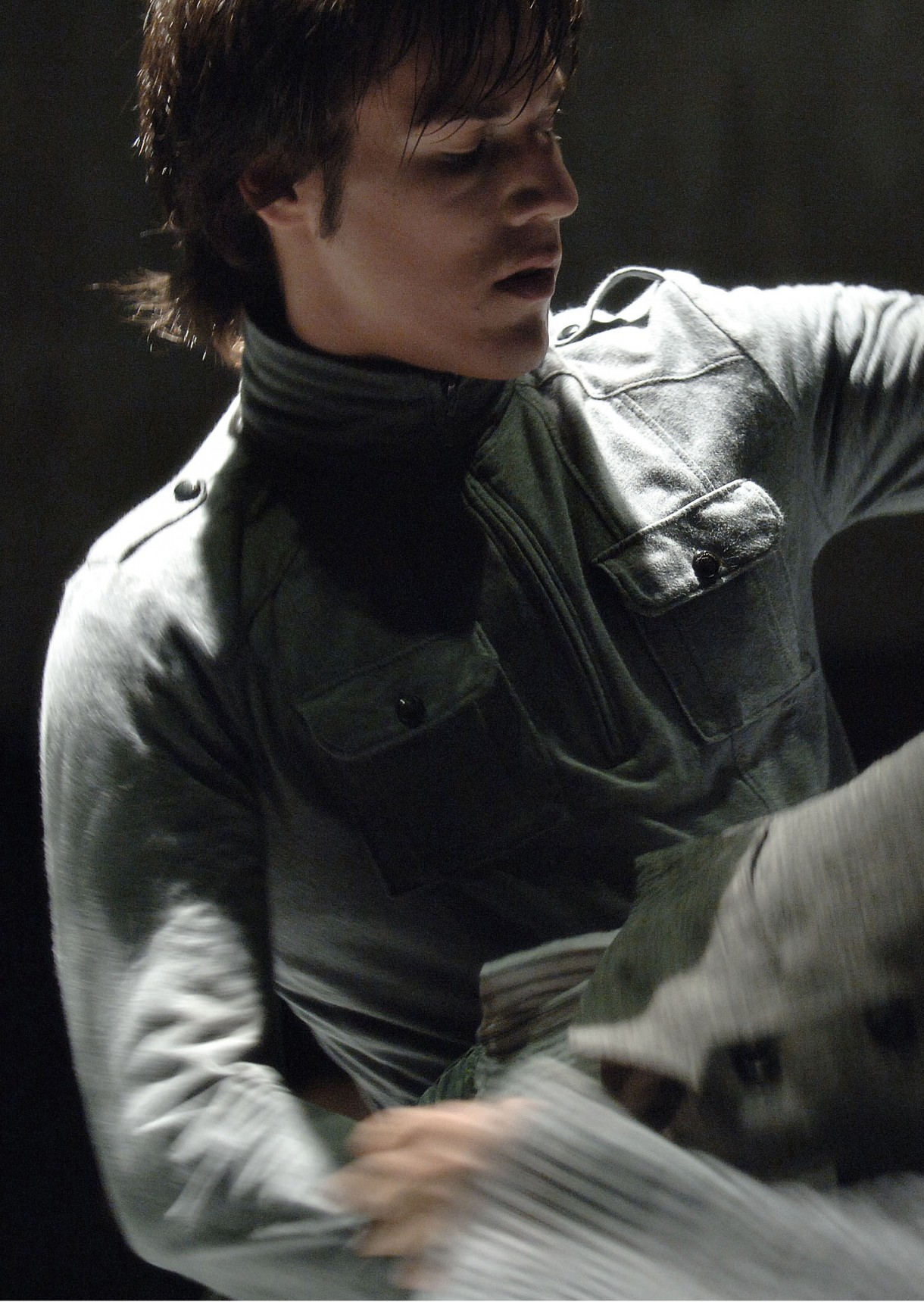Each workshop emphasizes one of four axes of thought and experimentation : SPACE, TIME, IDENTITY and ALTERITY. These four thematics share the fall and winter calendar and make up the program of the intensive summer workshop.
Courses
Languages
A - Physical Theater I
Open to all, two weekly periods of 1h45.
Introduction to physical acting in theatre practice and performance.
TECHNIQUE – Participants are introduced to the Decrouxian* mime style, a definitive gestural grammar. They learn to integrate the fundamental principles of physical theatre, awareness, and movement into a unified form of dramatic expression, and to develop their own personal performance style: Body articulation – The theatrical phrasing of movement – Planes, lines and areas in space – Causality – Walks and displacements in space – Study of counterweights – Figures of style: dynamics of structure and rhythm – The aesthetics of courtesy.
IMPROVISATION – Through solo, duet and ensemble improvisation work, participants apply the theories and techniques they have learned. They harness and develop their ideas and intuition through listening, awareness and critical observation: The imaginary body: presence, neutrality and abstraction – Study of different performance styles – The impact of space on physical vocabulary and expression – The relationship between movement and time (real and dramatic) – Transposition: from natural to theatrical movement, from performer to character.
B - Physical Theatre II
Prerequisite: Participants must have studied at the École or have previous performing arts experience.
This course covers the same material as Physical Theatre I, but more quickly and in greater depth.
C - Creative Development Workshop
Open to all.
CREATION - Working together to develop a short performance piece, participants experiment with different forms and techniques of physical expression. The workshop structure encourages participants to use their imagination and develop their awareness. The participants/ actors perfect their performance technique and explore the implications of different artistic choices : Transposition: from natural to theatrical movement, from performer to character – Physical performance – The dramatic arc of a play – The theatrical phrasing of movement.
At the end of the course, participants perform their collective creation for École faculty and fellow students.
D - Physical Theater (complementary)
Open to beginner and advanced participants, this 2h30 saturday morning' dynamic class integrates technique and improvisation.
This course covers the same material as Physical Theatre I. The mixed levels expose beginners to models of virtuosity, and recalls more advanced students the process of apprenticeship and assimilation.
E - The Corporeal Actor
This course is intended for artists who have previous training in theatre, dance or circus arts, or who are professional performers. These directed workshops focus on the theoretical and practical explorations of the participants.
Developing a Character (Sessions 1 and 3)
From the real to the abstract, the principles and practice of physical theatre are used to develop characters and performance styles. Subjective impressions and states of mind provide the inspiration for a dramaturgy without words.
Physicality and Language (Sessions 2 and 4)
Consistent interaction, integration or juxtaposition of the corporeal score and spoken or written text; telling in words vs. telling in movement. Exploring the extraordinary and the unconventional.
F - Physical Theatre and the Eloquence of the Body
Four weekend seminars of 10 hours each.
These intensive sessions are intended for artists interested in various elements of stagecraft: staging, choreography, scriptwriting, screenwriting, project management, directing. The vast repertoire of OMNIBUS le corps du théâtre, its philosophy, its rules of the art, constitutes the basic material. They require a proactive commitment, both physical and intellectual.
From the art of the body to a body of theatre ...
The instructional approach is based on the actor’s primary role in creating a performance or dramatic work and investing it with meaning. Reflecting the universality of the language of movement, each seminar examines a different aspect of corporeal culture :
SEMINAR (CREATION) 1- The Theatrical Repertoire
SEMINAR (CREATION) 2 - Adaptations, Translations and Palimpsests
SEMINAR (CREATION) 3 - Contemporary Creative Currents
SEMINAR (CREATION) 4 - Crossovers and Hybrids
The four seminars are independant one from the other; participation to previous seminars is not a prerequisite.
G - THEMATIC WORKSHOP – SPACE
September 12, 14, 19, 21 and 26, 2024
Multilevel group (beginner and advanced)
Thursday - 5h30 pm »» 7h30 pm / Saturday - 9h30 am »» 12h00 pm / 1h00 pm »» 3h30 pm
H - THEMATIC WORKSHOP – TIME
October 3, 5, 10, 12 and 17, 2024
Multilevel group (beginner and advanced)
Thursday - 5h30 pm »» 7h30 pm / Saturday - 9h30 am »» 12h00 pm / 1h00 pm »» 3h30 pm
I - THEMATIC WORKSHOP – IDENTITY
October 24, 26 and 31, November 2 and 7, 2024
Multilevel group (beginner and advanced)
Thursday - 5h30 pm »» 7h30 pm / Saturday - 9h30 am »» 12h00 pm / 1h00 pm »» 3h30 pm
J - THEMATIC WORKSHOP – ALTERITY
November 14, 16, 21, 23 and 28, 2024
Multilevel group (beginner and advanced)
Thursday - 5h30 pm »» 7h30 pm / Saturday - 9h30 am »» 12h00 pm / 1h00 pm »» 3h30 pm
RCM_6

